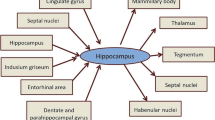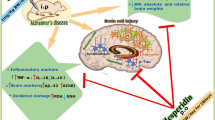Abstract
Valproic acid (VPA), an agent that is used to treat epileptic seizures, can cause spatial memory impairment in adults and children. This effect is thought to be due to the ability of VPA to inhibit neurogenesis in the hippocampus, which is required for learning. We have previously used an animal model to show that VPA significantly impairs hippocampal-spatial working memory and inhibits neuronal generation in the sub-granular zone of the dentate gyrus. As there are patient reports of improvements in memory after discontinuing VPA treatment, the present study investigated the recovery of both spatial memory and hippocampal neurogenesis at two time points after withdrawal of VPA. Male Wistar rats were given intraperitoneal injections of 0.9% normal saline or VPA (300 mg/kg) twice a day for 10 d. At 1, 30, or 45 d after the drug treatment, the novel object location (NOL) test was used to examine spatial memory; hippocampal cell division was counted using Ki67 immunohistochemistry, and levels of brain-derived neurotrophic factor (BDNF) and Notch1 were measured using western immunoblotting. Spatial working memory was impaired 1 and 30 d after the final administration, but was restored to control levels by 45 d. Cell proliferation had increased to control levels at 30 and 45 d. Both markers of neurogenesis (BDNF and Notch1 levels) had returned to control levels at 45 d. These results demonstrate that memory recovery occurs over a period of six weeks after discontinuing VPA treatment and is preceded by a return of hippocampal neurogenesis to control levels.
概要
目的
丙戊酸是一种用于治疗癫痫发作的药物, 可引起 成人和儿童的空间记忆障碍。 海马的神经发生与 学习能力密切相关, 而丙戊酸可抑制该区域的神 经发生, 从而导致空间记忆障碍。 我们已有动物 模型证明丙戊酸能显著损害海马-空间工作记 忆, 并抑制齿状回亚颗粒区域中的神经元生成。 既往临床病例报道指出患者在停用丙戊酸治疗 后记忆能力有所改善。 因此, 本实验研究停用丙 戊酸治疗后两个时间点的空间记忆和海马神经 发生的恢复情况。
创新点
研究了停用丙戊酸后的空间记忆恢复的时间进程 以及与海马神经发生变化之间的关系。
方法
雄性Wistar 大鼠每天两次腹膜内注射0.9%生理 盐水或丙戊酸(300 mg/kg), 持续10 天。 在药物 治疗结束后第1、30 或45 天, 使用新物体位置 (NOL)测试来检查空间记忆;使用Ki67 免疫 组织化学计数海马细胞分裂情况;并使用免疫印 迹法(western immunoblotting)测量脑源性神经 营养因子(BDNF)和Notch1 的水平。
结论
药物治疗结束后第1 天和第30 天大鼠的空间工作 记忆有受损, 但在第45 天时, 恢复到正常水平。 细胞增殖在第30 天和第45 天时增加至正常水 平。 神经发生的两种标志物(BDNF 和Notch1) 在第45 天时恢复到正常水平。 这些结果表明了 记忆能力的恢复发生在停用丙戊酸6 周内, 并且 该种效应发生在海马神经发生恢复至正常水平 后。
Similar content being viewed by others
References
Abrous DN, Koehl M, le Moal M, 2005. Adult neurogenesis:from precursors to network and physiology. Physiol Rev, 85(2):523–569. https://doi.org/10.1152/physrev.00055.2003
Bekinschtein P, Cammarota M, Katche C, et al., 2008. BDNF is essential to promote persistence of long–term memory storage. Proc Natl Acad Sci USA, 105(7):2711–2716. https://doi.org/10.1073/pnas.0711863105
Bewernick BH, Schlaepfer TE, 2013. Chronic depression as a model disease for cerebral aging. Dialogues Clin Neurosci, 15(1):77–85.
Bredy TW, Wu H, Crego C, et al., 2007. Histone modifications around individual BDNF gene promoters in prefrontal cortex are associated with extinction of conditioned fear. Learn Mem, 14(4):268–276. https://doi.org/10.1101/lm.500907
Breunig JJ, Silbereis J, Vaccarino FM, et al., 2007. Notch regulates cell fate and dendrite morphology of newborn neurons in the postnatal dentate gyrus. Proc Natl Acad Sci USA, 104(51):20558–20563. https://doi.org/10.1073/pnas.0710156104
Buckley PF, 2008. Update on the treatment and management of schizophrenia and bipolar disorder. CNS Spectr, 13(2Suppl 1):1–10; quiz 11–12.
Carpay JA, Aldenkamp AP, van Donselaar CA, 2005. Complaints associated with the use of antiepileptic drugs:results from a community–based study. Seizure, 14(3):198–206. https://doi.org/10.1016/j.seizure.2005.01.008
Carrozzo M, Koch G, Turriziani P, et al., 2005. Integration of cognitive allocentric information in visuospatial shortterm memory through the hippocampus. Hippocampus, 15(8):1072–1084. https://doi.org/10.1002/hipo.20126
Chaisawang P, Sirichoat A, Chaijaroonkhanarak W, et al., 2017. Asiatic acid protects against cognitive deficits and reductions in cell proliferation and survival in the rat hippocampus caused by 5–fluorouracil chemotherapy. PLoS ONE, 12(7):e0180650. https://doi.org/10.1371/journal.pone.0180650
Chan JP, Cordeira J, Calderon GA, et al., 2008. Depletion of central BDNF in mice impedes terminal differentiation of new granule neurons in the adult hippocampus. Mol Cell Neurosci, 39(3):372–383. https://doi.org/10.1016/j.mcn.2008.07.017
Costa RM, Drew C, Silva AJ, 2005. Notch to remember. Trends Neurosci, 28(8):429–435. https://doi.org/10.1016/j.tins.2005.05.003
Cunha C, Brambilla R, Thomas KL, 2010. A simple role for BDNF in learning and memory? Front Mol Neurosci, 3:1. https://doi.org/10.3389/neuro.02.001.2010
Cysique LA, Maruff P, Brew BJ, 2006. Valproic acid is associated with cognitive decline in HIV–infected individuals:a clinical observational study. BMC Neurol, 6:42. https://doi.org/10.1186/1471-2377-6-42
Das CM, Aguilera D, Vasquez H, et al., 2007. Valproic acid induces p21 and topoisomerase–II (a/ß) expression and synergistically enhances etoposide cytotoxicity in human glioblastoma cell lines. J Neurooncol, 85(2):159–170. https://doi.org/10.1007/s11060-007-9402-7
Dix SL, Aggleton JP, 1999. Extending the spontaneous preference test of recognition:evidence of object–location and object–context recognition. Behav Brain Res, 99(2):191–200. https://doi.org/10.1016/S0166-4328(98)00079-5
Ehninger D, Kempermann G, 2008. Neurogenesis in the adult hippocampus. Cell Tissue Res, 331(1):243–250. https://doi.org/10.1007/s00441-007-0478-3
Ennaceur A, Delacour J, 1988. A new one–trial test for neurobiological studies of memory in rats. 1:Behavioral data. Behav Brain Res, 31(1):47–59. https://doi.org/10.1016/0166-4328(88)90157-X
Eriksson PS, Perfilieva E, Björk–Eriksson T, et al., 1998. Neurogenesis in the adult human hippocampus. Nat Med, 4(11):1313–1317. https://doi.org/10.1038/3305
Gualtieri CT, Johnson LG, 2006. Comparative neurocognitive effects of 5 psychotropic anticonvulsants and lithium. MedGenMed, 8(3):46.
Hao YL, Creson T, Zhang L, et al., 2004. Mood stabilizer valproate promotes ERK pathway–dependent cortical neuronal growth and neurogenesis. J Neurosci, 24(29):6590–6599. https://doi.org/10.1523/JNEUROSCI.5747-03.2004
Henry TR, 2003. The history of valproate in clinical neuroscience. Psychopharmacol Bull, 37(Suppl 2):5–16.
Hitoshi S, Alexson T, Tropepe V, et al., 2002. Notch pathway molecules are essential for the maintenance, but not the generation, of mammalian neural stem cells. Genes Dev, 16(7):846–858. https://doi.org/10.1101/gad.975202
Hommet C, Mondon K, de Toffol B, et al., 2007. Reversible cognitive and neurological symptoms during valproic acid therapy. J Am Geriatr Soc, 55(4):628. https://doi.org/10.1111/j.1532-5415.2007.01117.x
Hsieh J, Nakashima K, Kuwabara T, et al., 2004. Histone deacetylase inhibition–mediated neuronal differentiation of multipotent adult neural progenitor cells. Proc Natl Acad Sci USA, 101(47):16659–16664. https://doi.org/10.1073/pnas.0407643101
Imayoshi I, Sakamoto M, Ohtsuka T, et al., 2008. Roles of continuous neurogenesis in the structural and functional integrity of the adult forebrain. Nat Neurosci, 11(10):1153–1161. https://doi.org/10.1038/nn.2185
Jessberger S, Nakashima K, Clemenson GD, et al., 2007. Epigenetic modulation of seizure–induced neurogenesis and cognitive decline. J Neurosci, 27(22):5967–5975. https://doi.org/10.1523/JNEUROSCI.0110-07.2007
Kee N, Sivalingam S, Boonstra R, et al., 2002. The utility of Ki–67 and BrdU as proliferative markers of adult neurogenesis. J Neurosci Methods, 115(1):97–105. https://doi.org/10.1016/S0165-0270(02)00007-9
Kee N, Teixeira CM, Wang AH, et al., 2007. Preferential incorporation of adult–generated granule cells into spatial memory networks in the dentate gyrus. Nat Neurosci, 10(3):355–362. https://doi.org/10.1038/nn1847
Kitabatake Y, Sailor KA, Ming GL, et al., 2007. Adult neurogenesis and hippocampal memory function:new cells, more plasticity, new memories? Neurosurg Clin North Am, 18(1):105–113. https://doi.org/10.1016/j.nec.2006.10.008
Kostrouchová M, Kostrouch Z, Kostrouchová M, 2007. Valproic acid, a molecular lead to multiple regulatory pathways. Folia Biol (Praha), 53(2):37–49.
Kwan P, Sills GJ, Brodie MJ, 2001. The mechanisms of action of commonly used antiepileptic drugs. Pharmacol Ther, 90(1):21–34. https://doi.org/10.1016/S0163-7258(01)00122-X
Lehrman G, Hogue IB, Palmer S, et al., 2005. Depletion of latent HIV–1 infection in vivo:a proof–of–concept study. Lancet, 366(9485):549–555. https://doi.org/10.1016/S0140-6736(05)67098-5
Li XN, Shu Q, Su JMF, et al., 2005. Valproic acid induces growth arrest, apoptosis, and senescence in medulloblastomas by increasing histone hyperacetylation and regulating expression of p21Cip1, CDK4, and CMYC. Mol Cancer Ther, 4(12):1912–1922. https://doi.org/10.1158/1535-7163.MCT-05-0184
Lossius MI, Hessen E, Mowinckel P, et al., 2008. Consequences of antiepileptic drug withdrawal:a randomized, double–blind study (Akershus study). Epilepsia, 49(3):455–463. https://doi.org/10.1111/j.1528-1167.2007.01323.x
Louissaint A Jr, Rao S, Leventhal C, et al., 2002. Coordinated interaction of neurogenesis and angiogenesis in the adult songbird brain. Neuron, 34(6):945–960. https://doi.org/10.1016/S0896-6273(02)00722-5
Masmoudi K, Gras–Champel V, Masson H, et al., 2006. Parkinsonism and/or cognitive impairment with valproic acid therapy:a report of ten cases. Pharmacopsychiatry, 39(1):9–12. https://doi.org/10.1055/s-2006-931471
Mayhew TM, Burton GJ, 1988. Methodological problems in placental morphometry:apologia for the use of stereology based on sound sampling practice. Placenta, 9(6):565–581. https://doi.org/10.1016/0143-4004(88)90001-X
Meador MJ, 2007. The basic science of memory as it applies to epilepsy. Epilepsia, 48(Suppl 9):23–25. https://doi.org/10.1111/j.1528-1167.2007.01396.x
Mumby DG, Gaskin S, Glenn MJ, et al., 2002. Hippocampal damage and exploratory preferences in rats:memory for objects, places, and contexts. Learn Mem, 9(2):49–57. https://doi.org/10.1101/lm.41302
Mustafa S, Walker A, Bennett G, et al., 2008. 5–Fluorouracil chemotherapy affects spatial working memory and newborn neurons in the adult rat hippocampus. Eur J Neurosci, 28(2):323–330. https://doi.org/10.1111/j.1460-9568.2008.06325.x
Nissinen J, Pitkänen A, 2007. Effect of antiepileptic drugs on spontaneous seizures in epileptic rats. Epilepsy Res, 73(2):181–191. https://doi.org/10.1016/j.eplepsyres.2006.10.003
Quesseveur G, David DJ, Gaillard MC, et al., 2013. BDNF overexpression in mouse hippocampal astrocytes promotes local neurogenesis and elicits anxiolytic–like activities. Transl Psychiatry, 3(4):e253. https://doi.org/10.1038/tp.2013.30
Reed JM, Squire LR, 1997. Impaired recognition memory in patients with lesions limited to the hippocampal formation. Behav Neurosci, 111(4):667–675.
Seigers R, Schagen SB, Beerling W, et al., 2008. Long–lasting suppression of hippocampal cell proliferation and impaired cognitive performance by methotrexate in the rat. Behav Brain Res, 186(2):168–175. https://doi.org/10.1016/j.bbr.2007.08.004
Senturk V, Goker C, Bilgic A, et al., 2007. Impaired verbal memory and otherwise spared cognition in remitted bipolar patients on monotherapy with lithium or valproate. Bipolar Disord, 9(Suppl 1):136–144. https://doi.org/10.1111/j.1399-5618.2007.00481.x
Sgobio C, Ghiglieri V, Costa C, et al., 2010. Hippocampal synaptic plasticity, memory, and epilepsy:effects of longterm valproic acid treatment. Biol Psychiatry, 67(6):567–574. https://doi.org/10.1016/j.biopsych.2009.11.008
Sirichoat A, Chaijaroonkhanarak W, Prachaney P, et al., 2015. Effects of asiatic acid on spatial working memory and cell proliferation in the adult rat hippocampus. Nutrients, 7(10):8413–8423. https://doi.org/10.3390/nu7105401
Umka J, Mustafa S, ElBeltagy M, et al., 2010. Valproic acid reduces spatial working memory and cell proliferation in the hippocampus. Neuroscience, 166(1):15–22. https://doi.org/10.1016/j.neuroscience.2009.11.073
Wang HD, Dunnavant FD, Jarman T, et al., 2004. Effects of antipsychotic drugs on neurogenesis in the forebrain of the adult rat. Neuropsychopharmacology, 29(7):1230–1238. https://doi.org/10.1038/sj.npp.1300449
Welbat JU, Sirichoat A, Chaijaroonkhanarak W, et al., 2016a. Asiatic acid prevents the deleterious effects of valproic acid on cognition and hippocampal cell proliferation and survival. Nutrients, 8(5):303. https://doi.org/10.3390/nu8050303
Welbat JU, Sangrich P, Sirichoat A, et al., 2016b. Fluoxetine prevents the memory deficits and reduction in hippocampal cell proliferation caused by valproic acid. J Chem Neuroanat, 78:112–118. https://doi.org/10.1016/j.jchemneu.2016.09.003
Welbat JU, Chaisawang P, Chaijaroonkhanarak W, et al., 2016c. Kaempferia parviflora extract ameliorates the cognitive impairments and the reduction in cell proliferation induced by valproic acid treatment in rats. Ann Anat, 206:7–13. https://doi.org/10.1016/j.aanat.2016.04.029
Wu HM, Zhang QZ, Gao JQ, et al., 2018. Modulation of sphingosine 1–phosphate (S1P) attenuates spatial learning and memory impairments in the valproic acid rat model of autism. Psychopharmacology (Berl), 235(3):873–886. https://doi.org/10.1007/s00213-017-4805-4
Zhao CM, Teng EM, Summers RG Jr, et al., 2006. Distinct morphological stages of dentate granule neuron maturation in the adult mouse hippocampus. J Neurosci, 26(1):3–11. https://doi.org/10.1523/JNEUROSCI.3648-05.2006
Zhao R, Daley GQ, 2008. From fibroblasts to iPS cells:induced pluripotency by defined factors. J Cell Biochem, 105(4):949–955. https://doi.org/10.1002/jcb.21871
Author information
Authors and Affiliations
Corresponding author
Additional information
Project supported by the Invitation Research of the Faculty of Medicine, Neuroscience Research and Development Group, Khon Kaen University, Thailand (No. I54119)
Rights and permissions
About this article
Cite this article
Pannangrong, W., Sirichoat, A., Wongsiri, T. et al. Valproic acid withdrawal ameliorates impairments of hippocampal-spatial working memory and neurogenesis. J. Zhejiang Univ. Sci. B 20, 253–263 (2019). https://doi.org/10.1631/jzus.B1800340
Received:
Revised:
Accepted:
Published:
Issue Date:
DOI: https://doi.org/10.1631/jzus.B1800340




